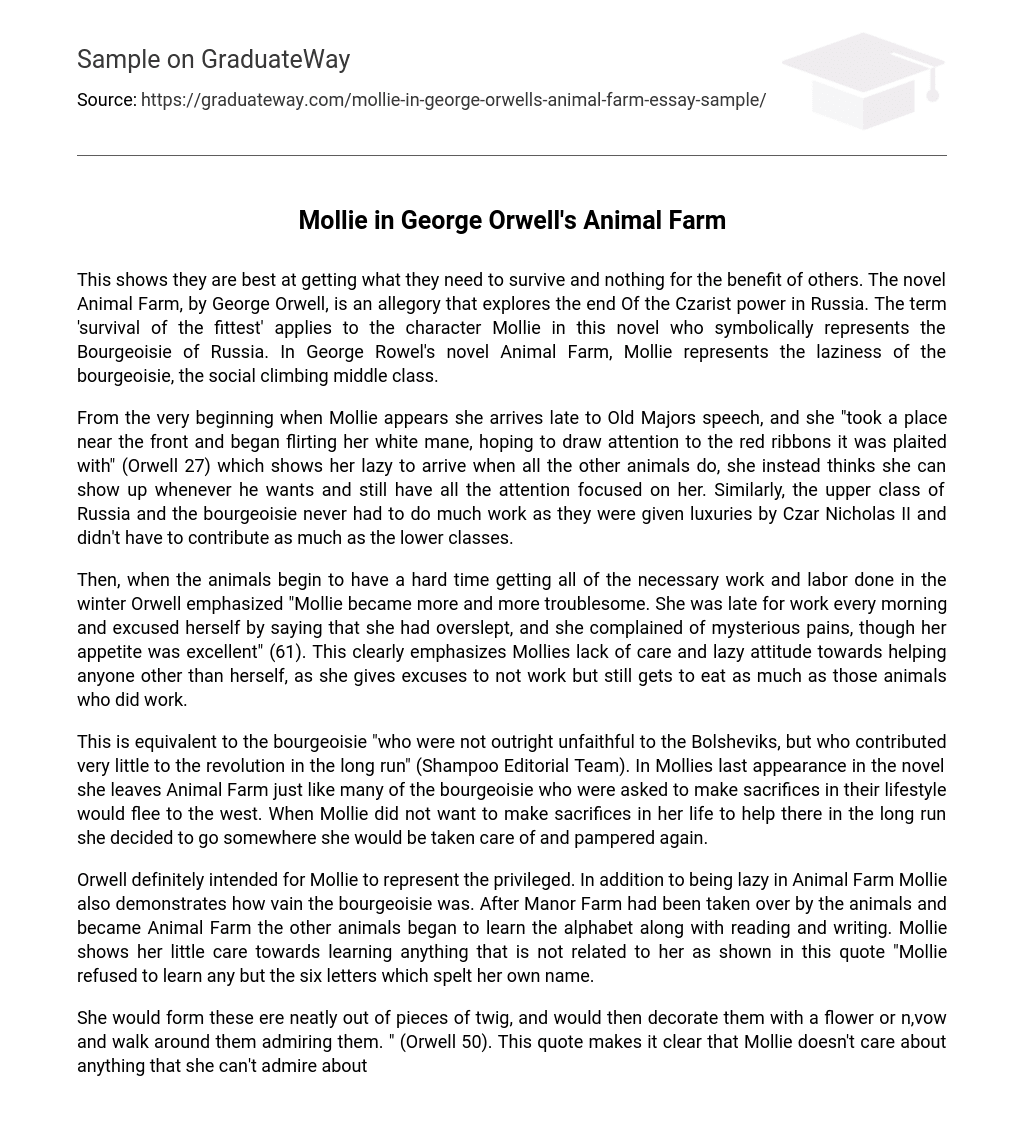This passage emphasizes that the characters in Animal Farm by George Orwell prioritize their own survival and neglect the well-being of others. The novel serves as an allegory for the decline of Czarist power in Russia. Mollie, a character in the book, represents the bourgeoisie and personifies the idea of “survival of the fittest.” In Animal Farm, Mollie embodies the typical laziness attributed to the bourgeoisie and mirrors middle-class aspirations for social standing.
From the outset, Mollie displays her habitual lateness to Old Majors speech. She deliberately positions herself near the front, adorning her white mane with red ribbons in an attempt to attract attention (Orwell 27). This behavior reveals her laziness in contrast to the other animals who arrive on time, implying that she believes she can arrive whenever she pleases and still be the center of attention. Similarly, the upper class in Russia and the bourgeoisie enjoyed a life of luxury provided by Czar Nicholas II, without having to put in as much effort as the lower classes.
In the winter, when the animals faced difficulty in accomplishing the required work, Orwell highlights how Mollie increasingly became a nuisance. She would consistently show up late for work and used the excuse of oversleeping, despite her excellent appetite. She would also complain of unexplained pains. This showcases Mollie’s evident lack of concern and lazy approach towards assisting others, as she avoids work yet still receives the same amount of food as the diligent animals.
A comparison can be made between Mollie’s departure from Animal Farm and the bourgeoisie, who did not betray the Bolsheviks but had limited impact on the revolution in the end (Shampoo Editorial Team). Mollie, like many bourgeoisie asked to make sacrifices, chose to leave Animal Farm and seek a life of luxury in the west. Just as Mollie refused to make sacrifices for the greater cause, she sought a place where she could be pampered and cared for without any obligations.
Orwell’s intention was for Mollie to symbolize the privileged class. In Animal Farm, Mollie exhibits laziness and exemplifies the vanity of the bourgeoisie. As the animals take over Manor Farm and establish Animal Farm, they start to acquire knowledge, including reading and writing skills. Mollie, however, disregards any education that does not directly concern her, as seen in her refusal to learn any letters beyond those that spell her own name.
According to Orwell (50), Mollie demonstrates her vanity by creating and embellishing twig ornaments that she admires herself. She shows her self-centeredness further by indulging in self-admiration while other animals are laboring diligently.
Mollie’s tendency to escape work and spend time by the drinking pool, where she would foolishly admire her own reflection in the water, highlights her prioritization of appearance over everything else (Orwell 61). This behavior can be likened to the vanity of the bourgeoisie who sought to imitate aristocracy through fashion and image, even though they were not truly aristocrats. As stated by Laotian, Ruby, Kelly Hughes, and Lee Havilland: “For the social climbing bourgeoisie, image was everything”.
The bourgeoisie desired to imitate the aristocrats in terms of wealth, yet they still wished to maintain their social status as part of the middle class. However, this aspiration was often unattainable, as clearly expressed in this quote: “Their aim was to imitate nobility, but not to replace it: they desired to create a world as luxurious as that of the aristocracy, with the morals and ethics of the bourgeois” (Laotian, Hughes, Havilland). This quote indicates that Mollie shares a similar sense of vanity and self-importance as the bourgeoisie in society, as Orwell portrayed her character with these characteristics.
In summary, George Orwell’s novel was intended to symbolically depict the individuals and events of the Russian Revolution. One of the characters, Mollie, represents the bourgeoisie and their values. Mollie’s lack of concern for others and focus on her appearance parallels the behavior of the bourgeoisie.





